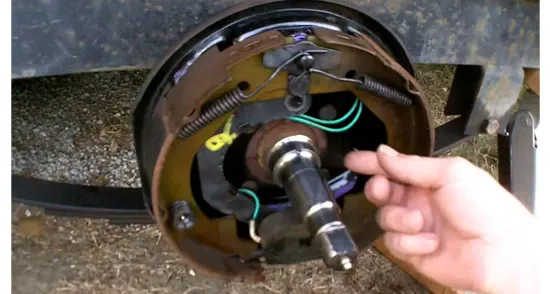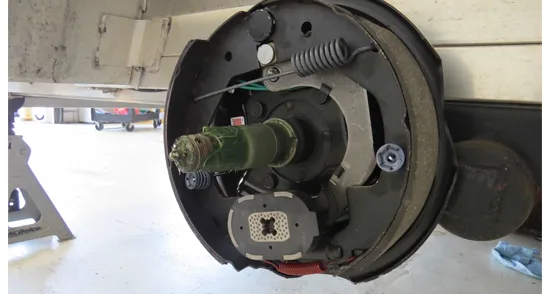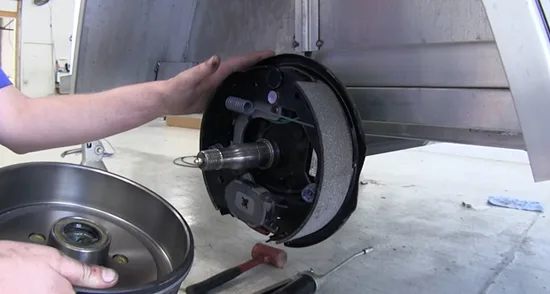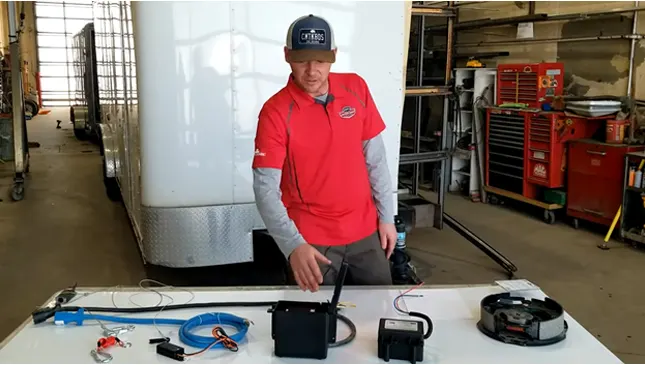Last Updated on April 17, 2023
In a trailer, the braking system is one of the most significant safety features. A trailer without reliable brakes is very difficult to control, especially when it stops. Normally, the brakes on a trailer are controlled by an electric brake controller powered by the breakaway battery.
But what happens if the battery is dead or disconnected? Will trailer brakes work without a battery? The trailer brake controller in the towing vehicle is supposed to supply the voltage for electric trailer brakes. Generally, if the breakaway battery is dead, the brakes might not work well.
If the trailer is equipped with an emergency break away switch, you can use it to engage the brakes in case of a power failure. Some electric brake controllers with manual overrides can operate the brakes without electric power. The following section provides an in-depth discussion of this topic.
Will Trailer Brakes Work Without Battery : Practical Answer

A travel trailer or trailer’s regular electric brakes might not properly brake without electricity. This is because the brakes on trailers are usually magnetically-activated, which means they use magnets to create the force needed to stop the trailer.
But in most cases, the brakes are applied by the towing vehicle when the towing vehicle brakes. The trailer’s battery runs a fail-safe switch that automatically closes if the electrical connection to the hitch fails. So, managing the brakes from the tow vehicle will still be possible even if the trailer battery is missing.
Without a battery, the brakes on the trailer will likely be less effective and may not stop the trailer as quickly. Also, if a vehicle with an automatic transmission is towing the trailer, the brakes may not function well.
So, if you are considering using trailer brakes without a battery. In that case, it is essential to hire a qualified mechanic to ensure that your trailer brake system is compatible and will work safely.
What Causes Electric Trailer Brakes to Stop Working?

Electric trailer brakes are a vital safety feature and must be functioning properly. There are several reasons why electric brakes might stop working, and it is crucial to diagnose the problem as soon as possible. Some notable causes of electric trailer brake problems include:
Brake Controller Issues:
The most common issue is a faulty brake controller itself. If the brake controller is not working correctly, it will not send the correct amount of energy to the brakes. This can cause the brakes to work improperly or not at all.
Another issue can be a problem with the controller’s faulty sensor. As the name suggests, the sensor is responsible for detecting when the trailer is braking. If the sensor is not working properly, it could lead to the brakes engaging too late or not at all.
Dead Battery:
It is also possible that your trailer’s batteries have failed. Most likely, you will experience this if you have not used your trailer for a while or if you have been leaving the lights on regularly.
If your trailer batteries are dead, you’ll need to recharge them before your electric brakes work again. Moreover, if the trailer’s battery is not sufficiently strong to power the brakes, it will not function.
Damaged Wiring:
Electric trailer brakes can be vulnerable to damage from faulty wiring. In some cases, the wires that connect the brakes to the tow vehicle can become frayed or broken, causing the brakes to fail.
Unfortunately, this damage is often not visible until it’s too late. That’s why it’s vital to check your trailer brakes by a qualified technician regularly. If you notice any strange sounds or smells coming from your brakes, or if the brake light on your trailer starts flickering, be sure to have them checked out right away.
Poor Wire Connections:
The electric brakes on trailers are vital to safety, but they can stop working for poor wire connections. Over time, the wires connecting the brakes to the towing vehicle may become corroded or damaged, causing them to break down and stop working.
There are a few reasons why this may happen:
- If the wires are not correctly connected, they can become loose over time and may eventually come disconnected.
- If they are not routed suitably, they can rub against each other or other objects, which can damage them and cause them to break.
- Also, when wiring is not adequately insulated, it can short circuit, which can also cause the brakes to fail.
Frozen Calipers:
If the caliper piston becomes frozen, the electric current will not be able to release it, and the brakes will not engage. Frozen calipers are typically caused by water or dirt getting into the brake system and freezing when the temperature drops.
The caliper needs to be thawed and cleaned to fix this issue. Once the caliper is thawed and cleaned, the electric current should be able to flow freely, and the brakes should work properly again.
Worn Brake Pads:
Over time, the brake shoe can become worn down, reducing its ability to grip the rotor and slow down the trailer. This can be especially problematic if you frequently tow heavy loads or travel on rough roads.
If you notice that your trailer brakes are starting to feel less responsive, it’s essential to have them checked by a qualified mechanic. In many cases, simply replacing the pads will be enough to get them working properly again.
These are some common reasons why trailer brakes might not be working. Check for these issues first if you’re having trouble with your trailer brakes.
Of course, it’s always best to consult a qualified mechanic if you still have trouble after checking for these common issues. They will be able to diagnose the problem and get your trailer brakes working properly.
What to Do When Trailer Brakes Fail?

When your trailer brakes fail, it can be a frightening experience. It’s everyone’s nightmare while driving: you press the brake pedal, and nothing happens. If your trailer brakes fail, don’t panic. Here are a few things you can do to stop your vehicle safely:
01. Downshift to a lower gear: If you can’t reduce the trailer speed, the first step is to lower your gear. Lowering your gear will slow the vehicle down and give you more control. Also, by reducing the gear, you can use your engine braking to reduce the speed.
02. Apply the parking brake: The parking brake is also helpful if you need to make a quick stop. If you are not used to towing trailers, you should practice applying the parking brake before hitting the road. It is also important to remember that when you are towing a trailer, you will have to use more force when braking.
This is because the extra weight of the trailer will cause your vehicle to slow down more slowly. As a result, giving yourself plenty of time to brake and leaving extra space between you and the car in front of you is crucial.
03. Use the emergency brake: During trailer brake failure, you should engage your hydraulic brakes. This will help slow down the vehicle, giving you more time to react. The emergency brake will help keep the trailer from fishtailing or jackknifing during a sudden stop.
Of course, ensuring the emergency brake is in good working order is always important before setting out on a trip. All trailers should be fitted with a safety brake and regularly tested to ensure it is working properly.
04. Safely get off the road & turn on hazard lights: In the event of a trailer brake failure, the best thing to do is to pull off the road immediately. This will prevent you from causing an accident. Pull over to the side of the road and turn on your hazard lights if you can.
This will let other drivers know that you are having trouble, and they should be aware of your situation. Once you are off the road, you can assess the situation and decide what needs to be done next.
05. Don’t turn the car off until you’ve stopped: Most people think turning off their vehicles will help them stop. In reality, this is not the case. Turning off the engine will result in the vehicle losing power steering and power brakes, making it more difficult to control.
When approaching a complete stop, it is advisable to leave the engine running. Once the vehicle has stopped, you can turn the engine off and assess the situation.
FAQs
Here are some frequently asked questions about trailer brakes:
Q: Why is My Trailer Brake Not Working?
There are a few potential reasons your trailer brake might not be working. One common reason is a faulty controller. If the controller does not send power to the brakes, they will not work.
Another possibility is that there is a short circuit somewhere in the brake system. This could be due to a bad wire or connector or caused by something blocking the brake lines. If there is a short circuit, it will prevent the power from reaching the brakes, and they will not work.
Q: How Does a Trailer Brake Battery Work?
A trailer brake battery is a deep-cycle battery designed to power the trailer brakes during a breakaway. The battery is usually mounted under the trailer frame and wired to the brake controller.
In most cases, the breakaway brakes system will also include a switch mounted on the tongue of the trailer, which, when activated, will send a signal to the brake pedal, causing it to apply the brakes.
Q: Do You Need a Battery for Electric Trailer Brakes?
Yes, an electric trailer brake requires batteries. The battery provides the power necessary to operate the brakes. Without a battery, the electric trailer brakes won’t work. The battery also helps to keep the trailer brakes cool and prevents them from overheating.
Q: Do Electric Trailer Brakes Lock When Unplugged?
No, electric brakes will not lock when unplugged. The brakes work by applying a current to the brake magnets, creating a magnetic field that pulls the brake drums against the inside of the wheel hub.
If no power is applied to the trailer brake magnets, they will not be able to create a magnetic field; therefore, pulling the brake drum against the wheel hubs will be impossible.
Q: Can You Test Trailer Brakes With a Battery?
Yes, you can test the brakes of a trailer with a battery. All you need is a 12-volt battery or a house battery and some essential hand tools. You’ll also want to ensure the trailer is connected correctly to the hauling vehicle so that the brakes are engaged when you start testing them.
Conclusion
Trailer brakes can work without a battery, though it may not be as effective as when there is a battery. The trailer brakes will still be able to function because they are connected to the hitch, but they may be less strong without the extra power from the battery.
For this reason, it is still necessary to have a fully charged battery in the trailer so that the brakes can function correctly. So if you properly understand will trailer brakes work without a battery, you can use them without any worries. Hopefully, this article was able to help you with your inquiry.



